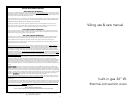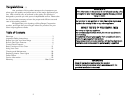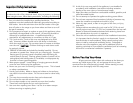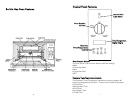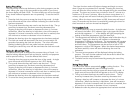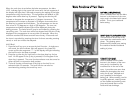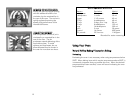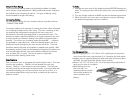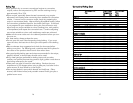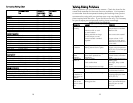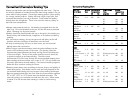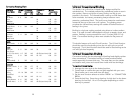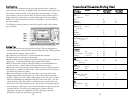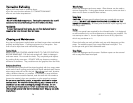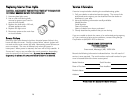
54
12. A risk of tip-over may result if the appliance is not installed in
accordance with installation instructions including excessive
loading of the oven door or from abnormal usage.
13. Keep area clean and free from combustible material, gasoline, and
other flammable liquids.
14. Do not attempt to operate the appliance during power failure.
15. Do not heat unopened food containers; buildup of pressure may
cause the container to explode and result in injury.
16. Never sit, step, stand, or lean on any part of the oven, or injury
may result.
17. Storage cabinet area above the unit must be 36” (91.4 cm) and
cannot project more than 13” (33.0 cm) outward from the rear wall.
Beware of potential hazards associated with retrieving items from
such cabinets when the unit is in operation.
18. Once the unit is installed as outlined in the Installation Instructions,
it is important that the fresh air supply is not obstructed. Ensure
that the kitchen is well-ventilated. Keep natural venting holes
open or install a mechanical ventilation device. Prolonged or
intensive use of the appliance may call for additional (such as
opening a window) or more effective ventilation (such as increasing
the level of a mechanical ventilation if present).
1. Your unit should be installed by a qualified technician. The
appliance must be installed and electrically grounded according to
local codes. Have this technician show the the location of the gas
shut-off valve on the range so you know where and how to turn off
the gas if necessary.
2. Do not attempt to repair or replace an part of this appliance unless
specifically recommended in this manual. All servicing should be
referred to a qualified technician. A qualified technician is
required for any adjustments or conversions to Nat. or LP gas.
3. The “push-to-turn” knob of this oven are designed to be child-
safe. However, children should not be left alone in the kitchen
while the range is in use. Do not store items of interest to children
over the unit.
CCAAUUTTIIOONN::
Children climbing to reach items could
be seriously injured.
4. GREASE is flammable and should be handled carefully. Do not
use water on grease fires. Never pick up a flaming pan. Smother
flaming pan by covering utensil completely with well-fitting lid,
cookie sheet or flat tray. Flaming grease outside of utensil can be
extinguished with baking soda or, if available, a multipurpose dry
chemical or foam type extinguisher.
5. Wear proper apparel. Loose-fitting or hanging garments should
never be worn while using the appliance.
6. Never use your oven for warming or heating a room. This is based
on safety considerations.
7. Use dry pot holders. Moist or damp pot holders on hot surfaces
may result in burns from steam. Do not use a towel or other bulky
cloth.
8. The vent ducts must also remain clear and unobstructed
9. Do not line the oven with aluminum foil.
10. Do not drape towels or any materials on oven door handles.
These items could ignite and you could get burned.
11. Use care when opening oven door. Let hot air or steam escape
before removing or replacing food.
WWAARRNNIINNGG
To reduce the risk of fire, electrical shock, injury to persons, or damage
when using the oven, follow basic precautions, including the following:
IImmppoorrttaanntt SSaaffeettyy IInnssttrruuccttiioonnss
BBeeffoorree YYoouu UUssee YYoouurr OOvveenn
All gas ovens are wiped clean with solvents at the factory to
remove any visible signs of dirt, oil, and grease which may have
remained from the manufacturing process. Before starting to cook,
clean the oven thoroughly with hot soapy water.



